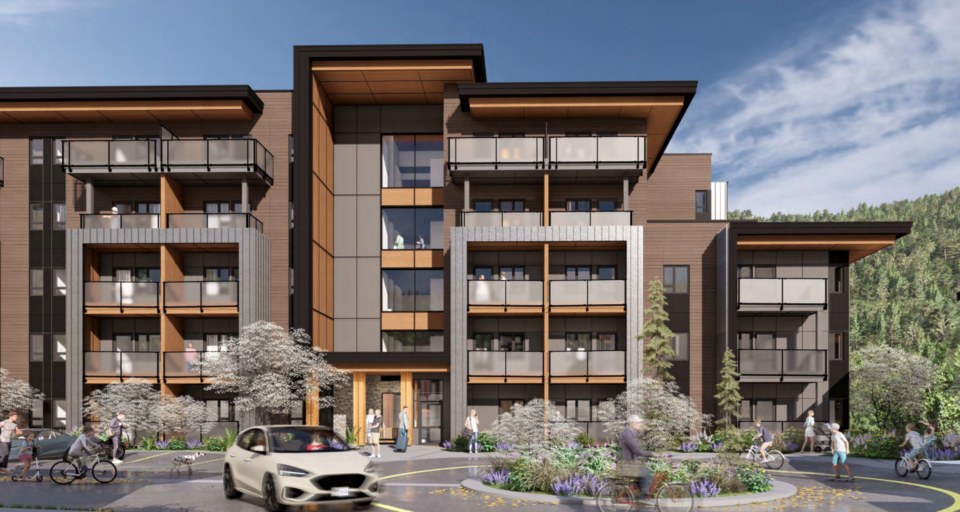Whistler’s largest employee-housing project in the pipeline was issued a development permit this week, despite lacking millions in funding.
Ahead of the development permit approval for Cheakamus Crossing, Lot 3 at 1600 Mount Fee Road on June 10, chief administrative officer Virginia Cullen presented a staff recommendation on the project’s financial feasibility and risks of moving forward with construction while grant funding remains unsecured. Staff proposed council direct them to present a revised project plan and funding strategy by June 24 before approving any further construction spending on the 125-unit development.
The municipality has already committed $5.9 million toward the project’s equity, but $7.2 million in grant funding—crucial to completing the capital stack—remains unconfirmed. Until that money is secured, staff advised no work beyond current site preparation and excavation take place.
However, to apply for grant funding, the project required an approved development permit.
“What we have now is a development permit and a building permit. We don't have a finalized financing plan. We don't have an execution of a parcel funding agreement, and so moving to the construction phase of the project, to me as staff, that does not make sense,” Cullen said. “So, we're recommending that the project not advance to construction until we have line of sight on how the project's going to be funded.”
She stressed one of the “many” risks of allowing construction before receiving full financing was limiting the ability to pivot the project design should the funding not materialize. On the flip side, she said delaying construction also comes with financial, timeline and scheduling constraints for contractors.
Cost escalation and timing risks
Lot 3 is the final major residential parcel in Cheakamus Crossing Phase 2 (CCP2) and would provide affordable rental housing in a multi-family building format. It’s also the most expensive Whistler Housing Authority/Whistler 2020 Development Corp. (WDC) project to date—roughly 40 per cent more per square foot than Lot 2B, completed just two years ago.
Rising construction and servicing costs, combined with limited remaining equity from earlier land sales in the neighbourhood, mean Lot 3 is particularly vulnerable to financial shortfalls. If the project advances prematurely, it could be locked into a building design before financial realities are known, potentially making course corrections more difficult later.
A risk worth taking
While staff were clear about the risks and their request for more time to refine the financing plan before WDC starts pouring concrete, council chose staff’s second option: move forward on spending while acknowledging the risks.
Council formally acknowledged the risk of permitting further construction before receiving an updated project plan and associated financing strategy. Staff were directed to notify the WDC that council has endorsed continued spending on Lot 3 site construction using funds already available to the corporation.
The move allows work to continue ahead of a finalized financial update, expected to be brought to council on June 24.
All members of council voted to proceed with the alternative approach while noting their understanding of the financial risks.
“It’s not an ideal scenario,” said Councillor Ralph Forsyth. “I think it keeps [it] moving forward. Our primary objective for the corporate plan, No. 1, was housing … I understand staff’s apprehension, but I don't want to put on the brakes, and I am absolutely, 100-per-cent comfortable with the board and their ability to pivot, if need be.”
Coun. Arthur De Jong pointed to his experience on construction sites and warned delays could increase costs.
“I really appreciate the heads up on this, but I'm willing to support that we continue moving on the project, and when we get the information [we can] take another look at that,” De Jong said.
Coun. Jen Ford stressed council has moved “heaven and earth” to greenlight housing over the last six years, and Coun. Jessie Morden reiterated she also didn’t want to delay the project.
Should the $7.2 million in grant funding not come through, Mayor Jack Crompton said in an interview after the meeting that options may include increasing rental rates, selling some units at market rate, seeking alternative grants, exploring lower interest rates or reducing construction costs.
“I mean the worst case, no money comes through, we would have to stop construction. And that is not an outcome that we expect,” Crompton said.
Following Cullen’s report, council approved the development permit for 1600 Mount Fee Road.




